牛津英语高二上U1MR 学案(keys)
上海牛津英语高二上册高二上Unit1U1同步讲义教案(含词汇语法练习)

学员编号:年级:高二课时数:学员姓名:辅导科目:英语学科教师:授课T单元知识同步 C (考点训练)T (基础知识,综合分析)类型授课日期时段教学内容一、Words and Phrases1.promise n. 许诺2.straight adj. 连续的,不间断的3.keep one’s word 遵守诺言4.despite prep. 不管,尽管5.shuttle n. 来往于两地间的火车、班车或航班6.resort n. 度假胜地;旅游胜地7.be dying to (do something) 渴望(做某事)8.scramble v. 争抢,推挤9.check in 到达并登记10.instructor n. 教练,指导者11.sideways adv. (斜)向一边;向旁边12.in case 以防13.to be honest 老实说14.definitely adv. 肯定They promised that all the books would be returned by Friday.他们保证所有的书籍会在周五之前归还。
【拓展】(1)promise n. 许诺;诺言;保证例:We received many promises of help.许多人答应帮助我们。
【必背】make a promise 做出允诺keep a promise遵守诺言fulfill a promise实现诺言carry out a promise履行诺言break a promise违背诺言(2)promise V.预示例:It promises to be fine tomorrow.明天有望是个好天气。
Heavy snow promises a harvest.瑞雪兆丰年。
(3)promising ad/.有前途的;有希望的例:The results of the first experiment are not very promising.第一次实验的结果不容乐观。
上海牛津版高二上册英语Unit1 my favorite sportmore reading教案
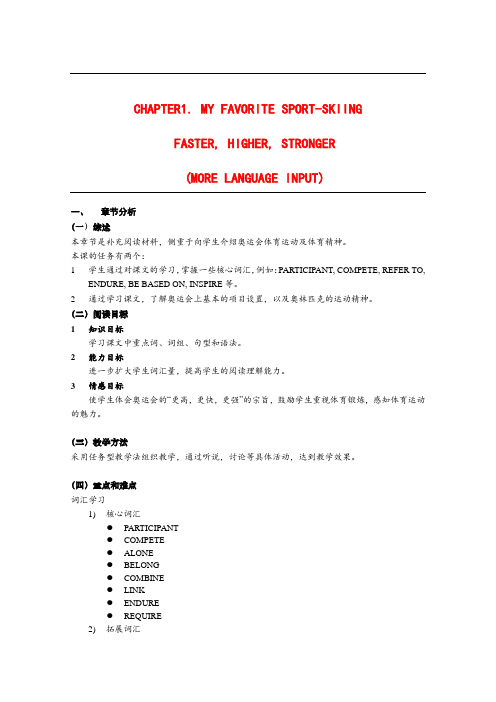
CHAPTER1. MY FAVORITE SPORT-SKIINGFASTER, HIGHER, STRONGER(MORE LANGUAGE INPUT)一、章节分析(一)综述本章节是补充阅读材料,侧重于向学生介绍奥运会体育运动及体育精神。
本课的任务有两个:1学生通过对课文的学习,掌握一些核心词汇,例如:PARTICIPANT, COMPETE, REFER TO, ENDURE, BE BASED ON, INSPIRE等。
2通过学习课文,了解奥运会上基本的项目设置,以及奥林匹克的运动精神。
(二)阅读目标1知识目标学习课文中重点词、词组、句型和语法。
2能力目标进一步扩大学生词汇量,提高学生的阅读理解能力。
3情感目标使学生体会奥运会的“更高,更快,更强”的宗旨,鼓励学生重视体育锻炼,感知体育运动的魅力。
(三)教学方法采用任务型教学法组织教学,通过听说,讨论等具体活动,达到教学效果。
(四)重点和难点词汇学习1)核心词汇●PARTICIPANT●COMPETE●ALONE●BELONG●COMBINE●LINK●ENDURE●REQUIRE2)拓展词汇●ATHLETICS●EMBODIMENT●MOTTO●SPORTSMANSHIP●TRACK3)词组和短语●REFER TO● A SERIES OF●PURSUE THE SPIRIT OF●COMBINED EVENTS●COMPETE FOR二、教学设计(TEACHING DESIGNS)/[链接2]I. READING THROUGH THE TEXT TO GET BASIC INFORMATION1.WHAT IS THE FEATURE OF FIELD EVENTS?2.WHAT IS THE FEATURE OF ROAD EVENTS?3.WHAT IS REQUIRED IN THE COMBINED EVENTS?4.HOW IS THE WINNING RECORDED?PARA 3: UNDERSTANDING DIFFICULT SENTENCE:ASK STUDENTS TO INTERPRET THE PARAGRAPH IN ENGLISHTHE A______ (1) GREEKS FIRST HAD THE IDEA OF GETTING MEN TOGETHER EVERY FOUR YEARS TO HOLD AND WITNESS SPORTING E______(2). IN THOSE DAYS, WOMEN DID NOT P_______(3), THOUGH THEY HAD THEIR OWN, INDEPENDENT, EVENTS. THE IDEA WAS TO HA VE THE BEST A_______(4) FROM ALL OVER GREECE GA THER IN ONE FIELD AND C______(5) EVERY HOUR YEARS. THE FIRST WRITTEN REFERENCE TO THE OL YMPIC GAMES IS 776 BC. THEY L_______(6) UNTIL 389 AD. THE IDEA OF HA VING THE MODERN GAMES WAS S_______(7) IN THE MID 19TH CENTURY BUT THEY WERE NOT A WORLD EVENT UNTIL 1896. BESIDES BEING POSTPONED BECAUSE OF W____(8),THEY HA VE BEEN HELD SINCE EVERY DOUR YEARS IN D_______(9) CITIES AROUND THE WORLD.THE FIVE R______(10) THAT APPEAR ON THE OL YMPIC FLAG (COLORED YELLOW, GREEN, BLUE, BLACK AND RED) WERE I________(11) IN 1914. THEY REPRESENT THE FIVE CONTINENTS OF AFRICA, THE A________(12), AUSTRALIA, ASIA AND EUROPE. THE FLAG IS R______(13) IN THE HOST CITY AND THEN FLOWN TO THE NEXT ONE WHERE IT IS K_______(14) UNTIL THE NEXT GAMES. THE OL YMPIC TORCH, WHICH IS KEPT B_______(15) UNTIL THE CLOSE OF THE GAMES, SYMBOLIZES PURITY, THE DRIVE FOR PERFECTION AND THE STRUGGLE FOR V________ (16).THE ROUSING OL YMPIC ANTHEM IS THE SIMP L Y N_______(17) “OL YMPIC MUSIC” BY JOHN WILLIAMS, WHO W_____(18) IT FOR THE 1984 OL YMPICS, HELD IN LOS ANGELES. WHAT YOU HEAR FIRST ARE THE FORTY OR SO NOTES PLAYED ON HORNS WHICH FROM THE “BUGLER`S DREAM” (ALSO CALLED “OL YMPIC FANFARE”) BY LEO ARNAUD, FIRST P_____(19) IN THE 1968 GAMES.ONE PART OF THE O______(20) CEREMONY THAT TRIES TO KEEP THE SPIRIT OF THE GAMES AND S_________(21) ALIVE IS WHEN ONE ATHLETE, REPRESENTING ALL THOSE PARTICIPATING, SAYS AS F_______(22): “IN THE NAME OF A LL THE COMPETITORS, I P_______(23) THAT WE SHALL TAKE PART IN THESE OL YMPIC GAMES, RESPECTING AND ABIDING BY THE RULES WHICH GOVERNS THEM, IN THE TRUE SPIRIT OF SPORTSMANSHIP, FOR THE GLORY OF SPORT, AND THE H_______(24) OF OUR TEAMS.IN THE ANCIENT GAMES, ONL Y THE WINNER W AS CELEBRA TED. EACH WINNER WAS GIVEN A SIMPLE CROWN OF O_______(25) LEAVES TO WEAR ON HIS HEAD. THIS WAS THE ONL Y R_______(26) FOR HIS VICTORY. THOSE WHO CAME IN SECOND OR THIRD GOT N_______(27). INTERESTINGL Y, WHEN THE GAME STARTED AGAIN IN 1896, SILVER M______(28) WERE GIVEN TO THE FIRST PLACE WINNERS. LATER IN 1904 IN THE ST LOUIS GAMES, GOLF WAS THE T______(29) PRIZE. NOW OF COURSE, WE HA VE GOLD MEDAL FOR THE FIRST PLACE, SILVER MEDAL FOR SECOND AND B_______(30) FOR THIRD.。
上海牛津版高二上册英语unit1 sporting eventswriting学案 必修1
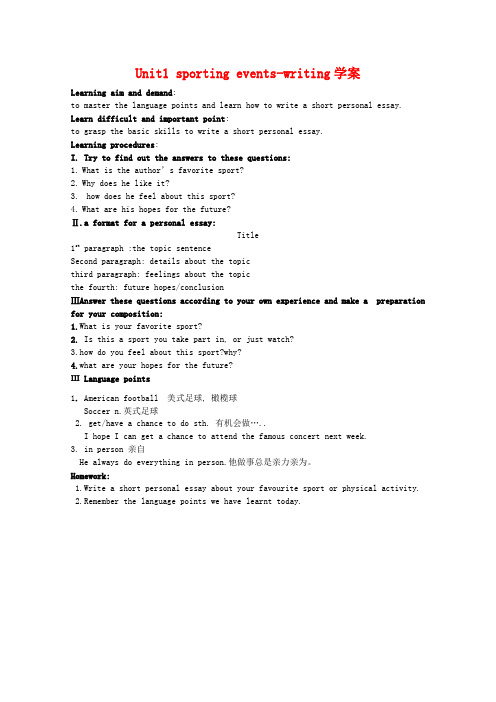
Unit1 sporting events-writing学案Learning aim and demand:to master the language points and learn how to write a short personal essay.Learn difficult and important point:to grasp the basic skills to write a short personal essay.Learning procedures:I. Try to find out the answers to these questions:1.What is the author’s favorite sport?2.Why does he like it?3. how does he feel about this sport?4.What are his hopes for the future?Ⅱ.a format for a personal essay:Title1st paragraph :the topic sentenceSecond paragraph: details about the topicthird paragraph: feelings about the topicthe fourth: future hopes/conclusionⅢAnswer these questions according to your own experience and make a preparation for your composition:1.What is your favorite sport?2. Is this a sport you take part in, or just watch?3.how do you feel about this sport?why?4.what are your hopes for the future?Ш Language points1. American football 美式足球, 橄榄球Soccer n.英式足球2. get/have a chance to do sth. 有机会做…..I hope I can get a chance to attend the famous concert next week.3. in person 亲自He always do everything in person.他做事总是亲力亲为。
牛津英语高二上U1教案1
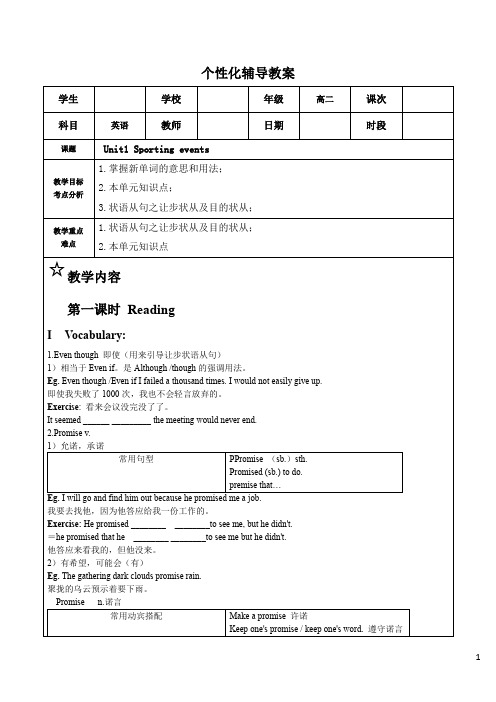
2)straight adj.直的,笔直的,直接的
Would you please give me a straight answer?请你给我个坦率的回答。
3)A's是A的复数形式。缩写、数字、字母的复数形式一般都以-'s结尾,有时也可直接加-s:
for the first time
在句子中单独做时间状语。不能引导状语从句。
the first time
名词词组用作连词,引导时间状语从句。其后不可加when。类似的还有:The moment,the instant,the second,the minute等。
He came to Shanghai for the first time.他第一次来上海。
MAs/MA's文学硕士;Some VIPs/VIP's重要人士
In the 1990s/1990's在20世纪90年代;
in his 50s/50's在他五十几岁时
They are two t's in the word letter.在“letter”这个单词里有两个“t”。
4.Keep one's word遵守诺言
10.In case conj.万一
Eg. Take an umbrell,in case it rains.带把伞以防下雨。
有时In case所引导的从句中还可以用should,但不能用will或shall。
Do remind me of the meeting in case I should forget.万一我忘记,你一定要提醒我开会这件事。
2021年高中英语 M1U完整导学案 牛津版必修1
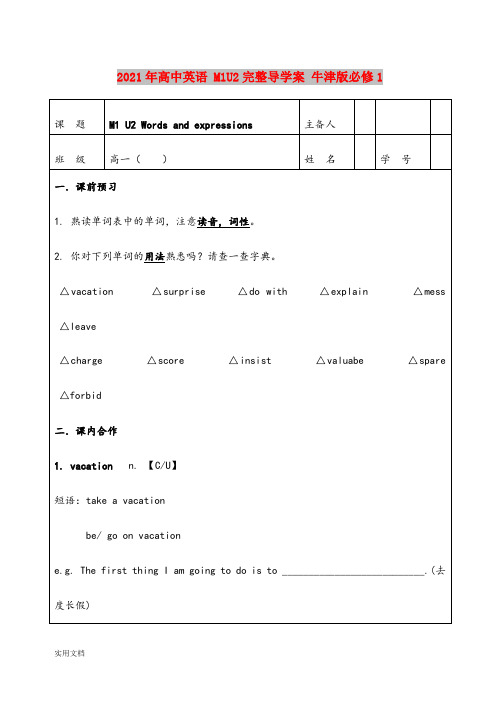
实用文档
2) n. free of charge in charge of in the charge of take charge of 翻译小练习: *一间带有浴室的房间要多少钱?___________________________________________ *手机充过电了。The phone got/was ________. *她负责照看小孩。She ____________________________looking after the children. 8. scene n. (戏剧的)一场,场面,景色
△ explain
△ mess
△leave
△ charge
△ score
△ insist
△ valuabe
△ spare
△bid
二.课内合作
1. vacation n. 【C/U】
短语:take a vacation
be/ go on vacation
e.g. The first thing I am going to do is to ___________________________.(去
2) v ________________________________ e.g. Don’t mess up my hair; I have just bed it. 6. leave+_______ +_________________ (复合结构) 请根据下列句子进行归纳:
上海牛津英语高二第一学期上海牛津英语高二第一学期教案

上海牛津英语高二第一学期上海牛津英语高二第一学期教案一、单元分析(UnitAnalyi)(二)单元目标(UnitTarget)分清定语从句各个关系代词和关系副词的用法,熟练运动定语从句进行描述和会话。
学会依照空间顺序进行写作,描述一个地方。
能运用一些词语和句型描绘航天知识和自己的感受。
;二、运用空间顺序来描述一个地方,可让学生自习完成,并通过书本相关练习加以反馈,使教师了解学生的掌握程度。
第83页Writing5Structure定语从句的复习是本课的语法教学内容。
教师可由学生自主归纳定语从句的知识点,并通过例句和对比加以补充和总结。
【链接3】定语从句复习着重知识点的一些教学建议。
课本第77页tructure6AdditionalReading本部分内容与Unit5课文内容直接相关,可作为辅助补充读物,让学生课后完成阅读。
建议教师在学生自我阅读之后着重指出一些词和词组让学生记忆:befacinatedby,dreamabout,getinvolvedin,dieaway,makeendmeet,keepa harpeyeon…针对“航空员应该具备的素质”这一话题,可在学生中开展讨论。
【链接4】话题讨论的一些教学建议。
课本第85页AdditionalReading说明:利用“头脑风暴”的教学手段,是一种提供学生积极思维的好机会,结合小组合作的方式,让学生列出尽可能多的关于“宇宙”的词汇(可根据词性分类)。
这一环节的运用既让学生通过回忆和启发回顾了曾经学过的有关“宇宙”的词汇,发挥学生的积极主动性以及小组间的合作性,又可引出和补充一些新的词汇,课文中的新词可以在这个环节上初步让学生有所认识。
【链接1】1.教师在黑板上写下“SpaceE 某ploration”,并提问“Whatoccurinyourmindimmediatelywhenyoueethitopic”2.在“头脑风暴”的过程中,教师鼓励学生列出尽可能多的关于“宇宙”的词汇,并在黑板上分类“noun”,“adj.”“verb”三栏。
牛津英语高二学考复习M1U2学案
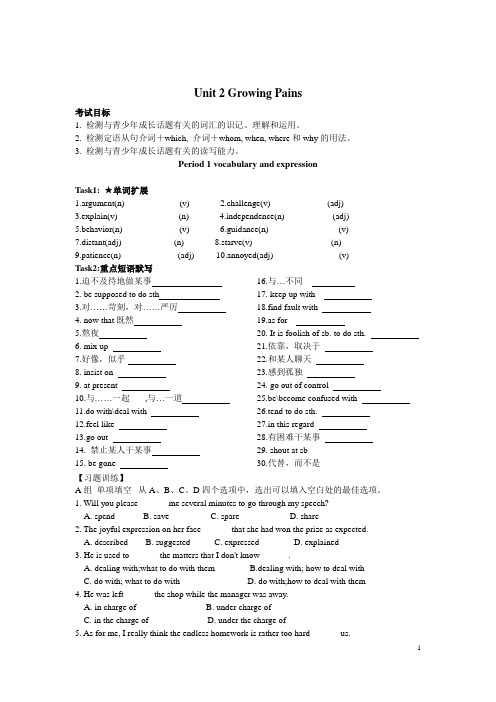
Unit 2 Growing Pains考试目标1. 检测与青少年成长话题有关的词汇的识记、理解和运用。
2. 检测定语从句介词+which, 介词+whom, when, where和why的用法。
3. 检测与青少年成长话题有关的读写能力。
Period 1 vocabulary and expressionTask1:★单词扩展1.argument(n) ____________(v)2.challenge(v)_____________(adj)3.explain(v)______________(n)4.independence(n)___________(adj)5.behavior(n)_____________(v)6.guidance(n)________________(v)7.distant(adj)____________(n)8.starve(v)__________________(n)9.patience(n)_____________(adj) 10.annoyed(adj)_______________(v) Task2:重点短语默写1.迫不及待地做某事2. be supposed to do sth3.对……苛刻,对……严厉4. now that既然5.熬夜6. mix up7.好像,似乎8. insist on9. at present10.与……一起,与…一道11.do with\deal with12.feel like13.go out14. 禁止某人干某事15. be gone 16.与…不同17. keep up with18.find fault with19.as for20. It is foolish of sb. to do sth.21.依靠,取决于22.和某人聊天23.感到孤独24. go out of control25.be\become confused with26.tend to do sth.27.in this regard28.有困难干某事29. shout at sb __________30.代替,而不是__________【习题训练】A组单项填空从A、B、C、D四个选项中,选出可以填入空白处的最佳选项。
译林牛津版高中英语模块1教案全套2
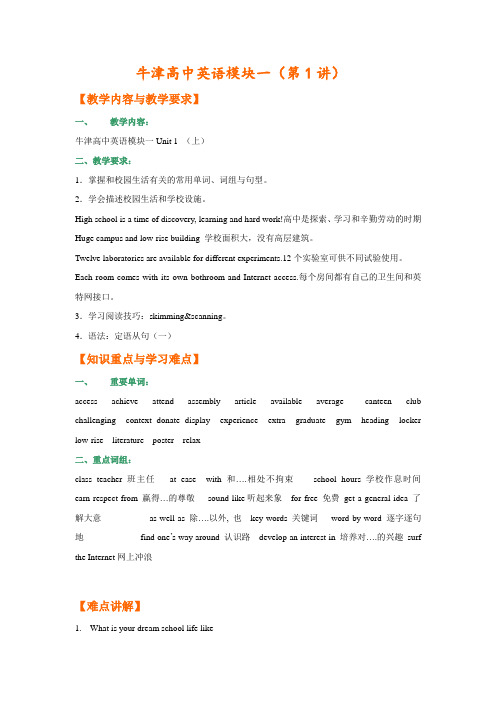
牛津高中英语模块一(第1讲)【教学内容与教学要求】一、教学内容:牛津高中英语模块一Unit 1 (上)二、教学要求:1.掌握和校园生活有关的常用单词、词组与句型。
2.学会描述校园生活和学校设施。
High school is a time of discovery, learning and hard work!高中是探索、学习和辛勤劳动的时期Huge campus and low-rise building 学校面积大,没有高层建筑。
Twelve laboratories are available for different experiments.12个实验室可供不同试验使用。
Each room comes with its own bothroom and Internet access.每个房间都有自己的卫生间和英特网接口。
3.学习阅读技巧:skimming&scanning。
4.语法:定语从句(一)【知识重点与学习难点】一、重要单词:access achieve attend assembly article available average canteen club challenging context donate display experience extra graduate gym heading locker low-rise literature poster relax二、重点词组:class teacher 班主任at ease with 和….相处不拘束school hours学校作息时间earn respect from 赢得…的尊敬sound like听起来象for free 免费get a general idea 了解大意as well as 除….以外, 也key words 关键词word by word 逐字逐句地find one’s way around 认识路develop an interest in 培养对….的兴趣surf the Internet网上冲浪【难点讲解】1.What is your dream school life like你理想中的学校生活是什么样子这里dream表示心目中最理想的. 如dream team (梦之队)。
牛津高中英语导学案:U1M3reading

牛津高中英语导学案:U1M3 readingU1M3 ReadingFogLearning GoalsAfter reading the story, you should1. know the plot of the story and learn how stories are generally organized;2. grasp the message conveyed by the story;3. achieve the right understanding of human society;预学案Read the story on Pages 2 and 3, and thenA. Do C2 on page 4. (put the events in the correct order)B. Answer the following questions:1. Why did Polly leave work early?2. Why did Polly take the underground to Green Park?3. Why was it that the old man could show the way round the city in such a heavy fog?4. Why did the old man volunteer to help people in the fog?5. Besides the bus conductor and the old man who helped her home, how many other people did Polly see or hear on the way?探究与运用案Step 1 Lead-inAs we have already learned in “Welcome to the Unit”, people use one or two senses more than they do other senses. Also, if one sense is impaired or damaged, other senses might become stronger. So blind people usually have sharp sense of hearing and/or touching and a splendid memory. In the story you have just read, the old man has lost his sight, but he is able tomove around in the fog while normal people could get lost.Step 2 Check-upA. (答案见教参)B.1. Because it was forecast that there would be a thick fog in the afternoon.2. Because the bus could not go as far as her home due to the fog.3. Because the old man was blind and the fog wouldn’t prevent him being able to move around.4. Because he wanted to pay back the help people had given him when it was sunny.5. Three. The tall man on the underground, the owner of the footsteps and the owner of the rough hand.Step 3 DiscussionA. Learn the general organization of stories and then tell why the writer describes the tall man on the underground, the footsteps and the rough hand.The general organizationof stroriesNote:Beginning: “Polly left work and stepped out into the fog.” (with no tension, i.e. Polly had no fear.)Upward trend: (Polly became more and more frightened.)Climax: Now she wanted to run, but fear held her still. (with the greatest tension, Polly was too frightened to move.) Downward trend: (Tension by and by fades away, with occasional little ups in the general downward trend: e.g. Line 45: Polly was beginning to feel frightened again. )Ending: (Tension completely disappears. )For teachers’ reference: those three people are arranged in the plot to increase tension, or to create a situation in which Polly became more and more frightened.B. Tell why the story is titled “Fog” (with the following to help you)1. When you read the story, did you feel anxious or worried about Polly’s safety?2. Some were afraid that someone was following Polly when they read about footsteps approaching her on her way to Park Street. Did you feel the same?3. When you read about a rough hand brushing Polly’s cheek, did you also think the man was attempting something ill?4. If all your answers to the above questions are “yes”, can we say that common people have an unreasonable prejudice against strangers?So, given the special heroin (a young girl alone) and the special setting (a heavy fog where nobody else could see what wrong a stranger might do to her), tell why the story is thus titled.For teachers’ reference: The story took place in a fog, but, more significantly, the title “Fog” is to indicate people’s prejudice against strangers or the fact that we tend to think ill of people in a strange environment.C. There are in the story some hints suggesting that the three strangers Polly saw or heard on her way had no ill intention for her at all. Find the examples of foreshadowing(伏笔)in the story that are to show us readers that we needn’t have been worrying about Polly.For teachers’ reference:Line17: The tall man was nowhere to be seen.Line 23: The footsteps were gone.Line 24: The man moved away.Step 4 PresentationTell the whole class what answers you have got to the three questions in Step 3.Step 5 SummaryFrom the story, what can we learn?For teachers’ reference: From the story we learn that most people are kind and helpful. We shouldn’t habitually think ill of strangers. Prejudice prevents us from truly understanding humans, so we normal people sometimes are not so wise as the blind because there is no fog in their eyes. Just as fogs don’t stay, we should not let our prejudice last.检测巩固案Retell the story with the following to help you:take the underground, where ...first heard footsteps, then a rough hand ..., which ...a man’s voice, a hand grasped her arman old man standing before herhelped her homeit turned out that ..., blind, volunteered to help, gratefultend to guard against, but ...。
牛津高中英语模块2第1单元课文.导学案
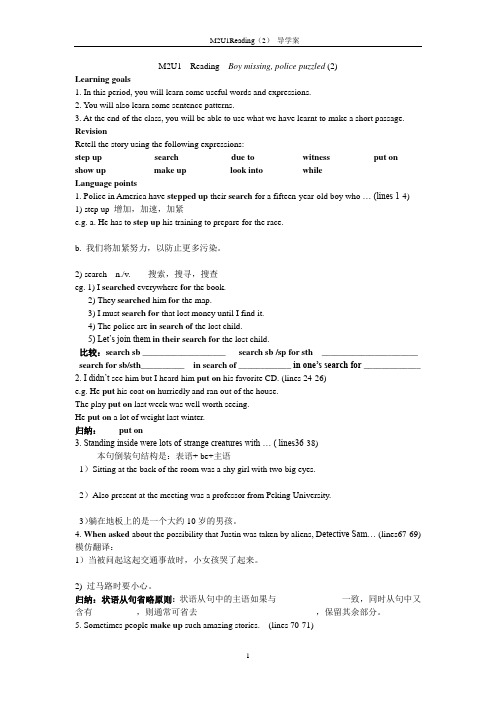
M2U1 Reading Boy missing, police puzzled (2)Learning goals1. In this period, you will learn some useful words and expressions.2. You will also learn some sentence patterns.3. At the end of the class, you will be able to use what we have learnt to make a short passage. RevisionRetell the story using the following expressions:step up search due to witness put on show up make up look into whileLanguage points1. Police in America have stepped up their search for a fifteen-year-old boy who … (lines 1-4)1) step up 增加,加速,加紧e.g. a. He has to step up his training to prepare for the race._______________________________________________________________________________ b. 我们将加紧努力,以防止更多污染。
_______________________________________________________________________________ 2) search n./v. 搜索,搜寻,搜查eg. 1) I searched everywhere for the book. ____________________________________________2) They searched him for the map. _______________________________________________3) I must search for that lost money until I find it. ___________________________________4) The police are in search of the lost child. ________________________________________5) Let’s join them in their search for the lost child.__________________________________ 比较:search sb ___________________ search sb /sp for sth ______________________ search for sb/sth__________ in search of ____________ in one’s search for _____________2. I didn’t see him but I heard him put on his favorite CD. (lines 24-26)e.g. He put his coat on hurriedly and ran out of the house. ______________________________ The play put on last week was well worth seeing. __________________________________ He put on a lot of weight last winter. _____________________________________归纳:put on ________________________________________3. Standing inside were lots of strange creatures with … ( lines36-38)本句倒装句结构是:表语+ be+主语1)Sitting at the back of the room was a shy girl with two big eyes.___________________________________________________________________________ 2)Also present at the meeting was a professor from Peking University.____________________________________________________________________________ 3)躺在地板上的是一个大约10岁的男孩。
上海牛津版高二上册英语Unit1 my favorite sport skiinggrammar教案 S2A(1)
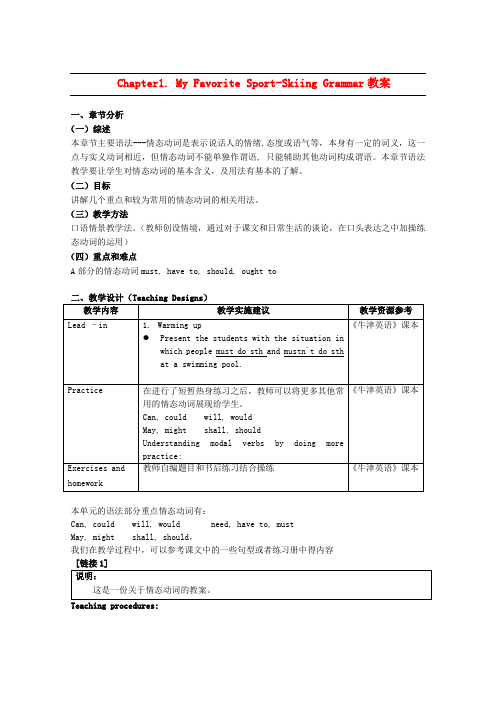
Chapter1. My Favorite Sport-Skiing Grammar教案一、章节分析(一)综述本章节主要语法---情态动词是表示说话人的情绪,态度或语气等,本身有一定的词义,这一点与实义动词相近,但情态动词不能单独作谓语, 只能辅助其他动词构成谓语。
本章节语法教学要让学生对情态动词的基本含义,及用法有基本的了解。
(二)目标讲解几个重点和较为常用的情态动词的相关用法。
(三)教学方法口语情景教学法。
(教师创设情境,通过对于课文和日常生活的谈论,在口头表达之中加操练态动词的运用)(四)重点和难点A部分的情态动词must, have to, should, ought to二、教学设计(Teaching Designs)本单元的语法部分重点情态动词有:Can, could will, would need, have to, mustMay, might shall, should,我们在教学过程中,可以参考课文中的一些句型或者练习册中得内容[链接1]Teaching procedures:Step one:Present the students with the situation in which people must do sth and mustn`t do sth at a swimming pool.Examples:1. Excuse me, you must not smoke2.You must not dive3.You must not flight.4.You must wear a swimming costume5. You must shower before enteringStep Two:(在进行了短暂热身练习之后,教师有意识地将书中其他使役情态动词have to, ought to, ought not to 的用法呈现给学生。
)1. “have to” practice Present students with Exercise A2, asking them to make a dialogueS1: When does Rocky have to get up in the morning?S2: He has to get up at 4a.m.S1: What do Smiley and Moaner have to do while Rocky is running?S2: They have to cycle with Rockey.2. “Ought to, ought not to” practice (P10)S1: Ought he to throw his racket in the air?S2: No, he ought not to throw his racket in the air.S1: Ought he be rude to his opponent?S2: No, he ought not to be rude to his opponent.(这部分是按照书上的情景对话,让学生在情景中自然的使用了情态动词,这种练习比较生活化,对学生来说也比较简单,但是还不足以掌握情态动词的更加深入的用法,所以在下一个步骤,教师有必要将主要的情态动词做系统讲解。
牛津高二上unit1
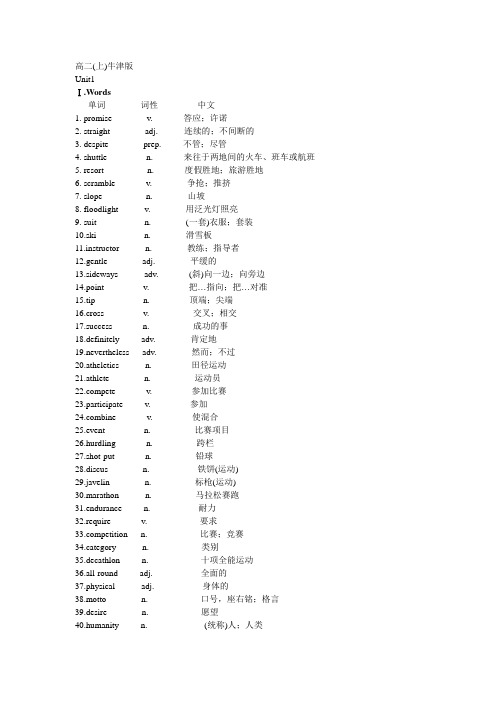
高二(上)牛津版Unit1Ⅰ.Words单词词性中文1. promise v. 答应;许诺2. straight adj. 连续的;不间断的3. despite prep. 不管;尽管4. shuttle n. 来往于两地间的火车、班车或航班5. resort n. 度假胜地;旅游胜地6. scramble v. 争抢;推挤7. slope n. 山坡8. floodlight v. 用泛光灯照亮9. suit n. (一套)衣服;套装10.ski n. 滑雪板11.instructor n. 教练;指导者12.gentle adj. 平缓的13.sideways adv. (斜)向一边;向旁边14.point v. 把…指向;把…对准15.tip n. 顶端;尖端16.cross v. 交叉;相交17.success n. 成功的事18.definitely adv. 肯定地19.nevertheless adv. 然而;不过20.atheletics n. 田径运动21.athlete n. 运动员pete v. 参加比赛23.participate v. 参加bine v. 使混合25.event n. 比赛项目26.hurdling n. 跨栏27.shot-put n. 铅球28.discus n. 铁饼(运动)29.javelin n. 标枪(运动)30.marathon n. 马拉松赛跑31.endurance n. 耐力32.require v. 要求petition n. 比赛;竞赛34.category n. 类别35.decathlon n. 十项全能运动36.all-round adj. 全面的37.physical adj. 身体的38.motto n. 口号,座右铭;格言39.desire n. 愿望40.humanity n. (统称)人;人类41.soar v. 高飞,翱翔Ⅱ.Phrases1. get straight A’s 得全优2. keep one’s word 遵守诺言3. be dying to (do something) 渴望(做某事)4. check in 到达并登记5. in case 以防6. to be honest 老实说7. manage to do 设法做成某事8. refer to 涉及;有关;指9. track event 径赛项目10.field event 田赛项目11.a series of 一系列12.be equal in 在…方面相同的13.in many ways 总体来说;在诸多方面Ⅲ.Sentence pattern1.And ,despite the expense, he did.2.Wearing skis for the first time makes you feel very strange.The first time I saw her, I thought her honest and sincere.3.You should not ski alone in case you fall and get injured.get+done表被动Ⅳ.Grammar1.Adverbial phrases and clauses of purpose:in order to, so as to; so that, in order that, in case2.Adverbial phrases and clauses of concession:Despite, in spite of; although, though, even if/though, while, whether…or, whatever/wherever/however=no matter + wh-。
上海秋季牛津英语高二上册高二上Unit1U1重点词汇句型复习(含词汇语法练习)
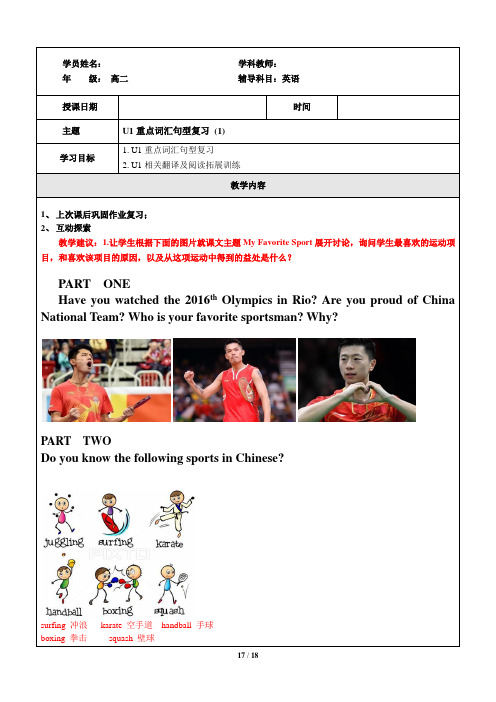
1、上次课后巩固作业复习;2、互动探索教学建议:1.让学生根据下面的图片就课文主题My Favorite Sport展开讨论,询问学生最喜欢的运动项目,和喜欢该项目的原因,以及从这项运动中得到的益处是什么?PART ONEHave you watched the 2016th Olympics in Rio? Are you proud of China National Team? Who is your favorite sportsman? Why?PART TWODo you know the following sports in Chinese?surfing 冲浪karate 空手道handball 手球boxing 拳击squash 壁球教学建议:1.此部分是课本同步中重点词汇短语解析,旨在帮助学生牢固掌握核心词汇用法并能在具体语境中灵活运用;2.对于词汇拼写可以采取先提问、默写的形式进行检测;对于词汇短语的用法课采取造句等形式,了解学生的掌握情况再进行讲解;3.老师在讲解的过程中注意词汇及词组辨析。
U1重点词汇句型复习【知识梳理1】Language Points from Main Textst year my father promised to take me on a holiday if I did well in my exams.去年我爸爸许诺,如果我在考试中取得好成绩,他就带我去度假。
promise v. 答应;许诺【必背】promise somebody something/promise something to somebody向某人承诺某事;答应给某人某物promise to do something答应做某事promise that…答应或保证…例:The mother promised the boy a new computer if he passed the examination.They promised to finish the work next week.他们,承诺下周完成工作。
高二module1教案于学案
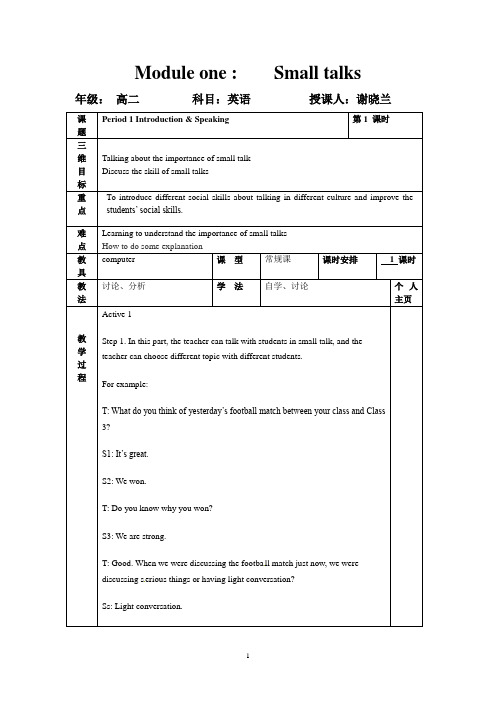
Module one : Small talks年级:高二科目:英语授课人:谢晓兰课题Period 1 Introduction & Speaking第1 课时三维目标Talking about the importance of small talk Discuss the skill of small talks重点To introduce different social skills about talking in different culture and improve the students’ social skills.难点Learning to understand the importance of small talks How to do some explanation教具computer 课型常规课课时安排 1 课时教法讨论、分析学法自学、讨论个人主页教学过程Active 1Step 1. In this part, the teacher can talk with students in small talk, and the teacher can choose different topic with different students.For example:T: What do you think of yesterday’s football match between your class and Class 3?S1: It’s great.S2: We won.T: Do you know why you won?S3: We are strong.T: Good. When we were discussing the footba ll match just now, we were discussing s erious things or having light conversation?Ss: Light conversation.T: Oh, yes. Just small talk.Step 2. After the teacher tell the students small talk, the students begin to read the dic tionary definitions of small talk then ask the stu dents to discuss the four questions inActivity1.Step 3. Divide the students into groups of two ones to discuss the five questions in Activity2. Then the teacher can choose some groups of students to show their small talk to all the students. The Ss can have different opinions, but they must give the reason for their opinions.Active 2Step 1. Ask Ss to discuss the sente nces in Activity 1 and then check the answers of the Ss’. Then learn the words in this part with the Ss.Step 2. As k the Ss to read the text quickly and then finish Activity2. Then ask all the Ss to discuss the questions of Activity 4. Then ask the Ss to tell us the usage of the words in Activity1 and Activity 4 and find the sentences in the text: impress, damage, encourage, prepare, avoid, lac k, recognize, smile.Step 3. Ask the students to read the text again, then answer the q uestions in Activity3 and encourage the Ss to have different an swers. If the time isn’t enough, we can solve the problem in the following ways.(1)Discuss it after class.(2)Discuss the following questions as the important points.I.What do people think about those who talk too much?II.Why is it a good idea to nod and smile when the other person is talking?III.What does the quotation from Benjamin Disraeli tell you about p eople?Then ask the Ss to prepare for Activity5 and then ask the Ss to tell the meanings of the phrases.Important word or phrases1. Which definitions make small talk sound like a positive thing?Sound is a link verb,its meaning in Chinese:听起来。
上海牛津版高二上册英语unit1 continuous learning单元学案 S2A
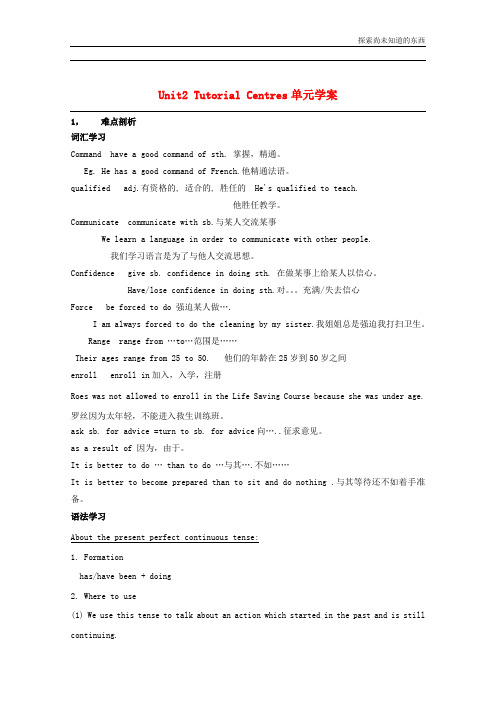
Unit2 Tutorial Centres单元学案1,难点剖析词汇学习Command have a good command of sth. 掌握,精通。
Eg. He has a good command of French.他精通法语。
qualified adj.有资格的, 适合的, 胜任的 He's qualified to teach.他胜任教学。
Communicate communicate with sb.与某人交流某事We learn a language in order to communicate with other people.我们学习语言是为了与他人交流思想。
Confidence give sb. confidence in doing sth. 在做某事上给某人以信心。
Have/lose confidence in doing sth.对。
充满/失去信心Force be forced to do 强迫某人做….I am always forced to do the cleaning by my sister.我姐姐总是强迫我打扫卫生。
Range range from …to…范围是……Their ages range from 25 to 50. 他们的年龄在25岁到50岁之间enroll enroll in加入,入学,注册Roes was not allowed to enroll in the Life Saving Course because she was under age. 罗丝因为太年轻,不能进入救生训练班。
ask sb. for advice =turn to sb. for advice向…..征求意见。
as a result of 因为,由于。
It is better to do … than to do …与其….不如……It is better to become prepared than to sit and do nothing .与其等待还不如着手准备。
牛津上海版高二英语上册同步学案 第1讲 定语从句
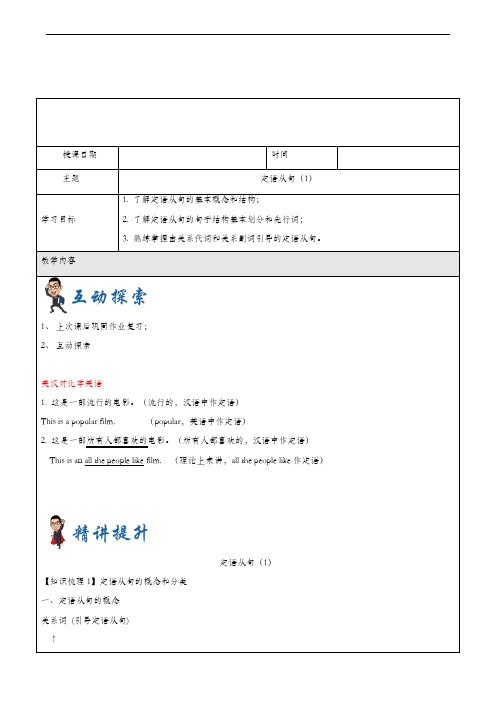
A. thatB. which C. who D. it
【知识梳理2】定语从句的关系词
(一)关系代词
1.指人的关系代词: who / whom / that
A. whichB. thatC. whereD. /
【巩固练习】
1.We’ll reach the sales targets in a month_________ we set at the beginning of the year.
A. whichB. where C. when D. what
eg: Let’s meet at the same place as we did yesterday.
批注:as的这种用法高考不会考到,会出现在较难的题目中。使用的条件是:必须是限制性定语从并根据;先行词前必须有the same, such, as修饰先行词,有些时候such本身可以充当先行词。要注意区分as在限制性和非限制性定语从句的用法。下面讲到的是as在非限制性定语从句中的用法。
3)关系代词前有介词
eg: Here is the money with which I will buy a piano.
小结2:⑴指物的关系代词中,在从句中充当主语的是which和that,在句中不可以省略。
⑵指物的关系代词中,在从句中充当宾语的是which和that,可以省略。
⑶当关系代词前有介词时,指物只能用which。
↓
先行词(被修饰词)
二、定语从句的分类
1.限制性定语从句:与先行词关系密切,如果没有定语从句,主句不完整,且与先行词之间无逗号。
高二上册Unit1教案(附练习)

高二上册Unit1教案(附练习)Unit 1 Making a differenceI. Teaching aims and demands类别课程标准要求掌握的项目话题Talking about science and scientistsTalking about people词汇Undertake analysis obvious within agriculture gravity curious branch debate scan boundary graduate research wheelchair disable theory seek misunderstand scientific observe match predict unhappiness crime astronomer telescope heaven intelligent patient experimentWork on go by go on with dream of turn out use up be satisfied with take a look at what if the other way around 功能1,描述人物(describing people)…you are twenty-one years old and a promising graduated student…The scientist is curious and careful. He is also intelligent and patient.2. 辩论(debating)I think biology is the most important and useful science because….. That’s correct that’s true It’s clear that……..I doubt that…. It’s hard to say…. Well. Maybe , but…. There’s no doubt that…. What’s your idea….. Have you thought about…..?语法动词不定式作主语,宾语,定语和状语1.动词不定式做主语To obey the law is everybody’s dutyHawking explain what it means to be a scientist2.动词不定式(短语)做动词宾语:Scientists try to describe and explain what we see.3.动词不定式(短语)做定语: That will be the only thing to do now.4. 动词不定式(短语)做状语,表示行为的目的,结果,原因等。
- 1、下载文档前请自行甄别文档内容的完整性,平台不提供额外的编辑、内容补充、找答案等附加服务。
- 2、"仅部分预览"的文档,不可在线预览部分如存在完整性等问题,可反馈申请退款(可完整预览的文档不适用该条件!)。
- 3、如文档侵犯您的权益,请联系客服反馈,我们会尽快为您处理(人工客服工作时间:9:00-18:30)。
SIIA U1-More Reading 词汇学案
Class _______ Name _______
I.Fill in the blanks
Faster, higher, stronger
The Olympic Games have a long history. The first modern Games were held in Athens, Greece in 1896. Every four years, athletes from all over the world compete in various sports at the Games. The largest group participates in athletics.
‘Athletics’ refers to sports in four areas: track, field, road and combined events. Track events, such as running and hurdling, test a person’s speed. In order to win a track event, a person needs to go faster than everyone else. Field events, however, test how high or far someone can jump in events such as the long jump or high jump. They also test how far someone can throw in events such as the shot-put, discus or javelin. The marathon and race walks are road events. They test endurance. In combined events, athletes are required to compete in a series of competitions from each category. The most famous combined event is the decathlon. The decathlon involves ten different athletics events that take place over two days. Since the decathlon tests all-round physical ability, the winner of the decathlon is often called ‘the world’s greatest athlete’. Although all Olympic sports are equal in importance, athletics is in many ways, the best picture of the Olympic motto ‘Faster, higher, stronger’. The desire of humanity to do better—to run faster, to soar higher and to push farther—is what the Olympics are all about.
II.Word Use
require
1.The project requires combined efforts. Require sth 要求某事
2.The teacher required us to keep quiet. =We are required to keep quiet.
Require sb to do sth 要求某人做某事=sb be required to do sth
3.The new job requires a lot of me. Require sb of sth 对某人有---的要求
4.The old concert hall requires repairing.= The old concert hall requires to be repaired.
Sth require doing= sth require to be done 某事需要被做
同类用法的还有need, want. Eg. The flower needs watering.
5.The situation requires that I should be there. Require that sb (should) do 要求某人该做某事
Translation
1.If you require further/more information about the new course of our school, please contact
the school counselor.
2.The notice requires us all to be present at the meeting.
3.Students are required to attend class/school on time no matter what the weather is like.
Whatever the weather is like, students are----.
4.As a new student, the girl requires much patience and energy of me.
involve
1.The strike involved many people. 涉及;牵连
2.The decathlon involves ten different athletic events. 包含,包括
3.The job involves me/ my living in London. Involve (doing) sth 需要
4.Don’t involve me in solving your problem. Involve sb in doing sth 使某人参加某活动;卷入
5.He was involved in a heated argument. Be involved in sth 被卷入
6.I was so involved in my book that I didn’t hear your knock. Be involved in 专注于;热心于Translation
1.The case involves many professional athletes.
2.Lots of government officials were involved in the scandal which shocked the whole nation.
3.All-round education involves enough governmental funds, qualified teachers and enough
social concerns.
4.Although he promised not to involve his privacy in his article, he found it hard to keep it.
desire
1.At the beginning of the new term, I can see your strong desire for knowledge._
the desire for sth对---的欲望
At the beginning---, I can see your strong desire to learn new knowledge.
____the desire to do sth_____________________做---的欲望
2.We all desire happiness and health.
3.After a whole day’s hard work, everyone desires t o go back home.
refer to
1.When I said some people are stupid, I wasn’t referring to you. _____指的是________
2.If you have any questions, refer to the guidebook.______参考;询问____________
3.The man who I referred to in my book is an artist.______提到_________________ Translation
1.李教授在昨天的会议上提出的建议提到了老年人的福利问题。
The motion/ suggestion that Professor Li put forward at yesterday’s meeting referred to the welfare of the elderly.
2.老板向他以前的雇主询问他的品行。
His boss referred to his former employer for his character.。
